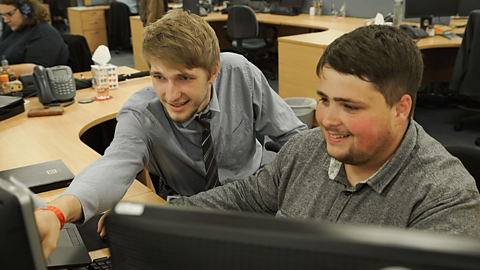Meet Bode, 19, to find out more about life as an apprentice software engineer at British Land. Part of our Bitesize world of work series.

I enjoy the complexity and being able to build whatever I want with computers; there are no limits.
How did you get your job?
As part of an internship, I worked on a youth engagement project. We worked closely with British Land so that led me to know a bit more about them and the work they do.
I found their apprenticeship schemes after doing some research online. I applied and now I'm working there as a software engineer apprentice.

What skills do you use on a typical day in your job?
Every day is different. I have been working on lots of different projects, for example, I worked with a flexible work space company to create a piece of software to make it easy for people to book meeting rooms.
I use problem solving skills most days because I do things like coding.
I also need to be able to communicate well with others.

What choices did you make to get where you are today?
I studied ICT at GCSE and Computer Science at A-level. I also taught myself a lot of IT skills, for example how to make a website and develop software. I used to do it for fun. I told British Land about this experience in my interview and they found it really intriguing.
My parents really wanted me to go to university but I wasn't keen. The price was too high for me and I thought there was another option. I'm now studying a degree alongside my apprenticeship. I had to prove myself because I originally started on a two-year higher apprenticeship which did not include a degree qualification.

Top tips
- Find your passion and follow it
- Nothing is certain in life – you have to learn how to work hard through uncertainty
- Have clear examples for interviews. I taught myself how to build a website and I used this experience to secure my job.

What to expect if you want to be an engineer
- How many people work in the engineering sector?
- What can you earn in different roles?
- What routes can you take to get in?
- Is the demand for engineers expected to grow in the future?
Watch the film to find out the answers to these questions, and much more!
Other resources
- See what type of engineering role might suit you with the
- Find out more about the different areas of engineering with this
- Learn more about roles in engineering with the
- Discover a practical new way to study via .
For careers advice in all parts of the UK visit: , , and .


Find work experience placements with Workfinder.
Tips and advice
Help with interviews, writing a CV and all things work experience related.


How to become an engineer. collection
Find out more about the engineering sector and how those currently working in it got their foot in the door.

Jack: app developer
Jack uses code in his job as an app developer.

Pauline: coder. video
Pauline uses code to create and manage websites.
